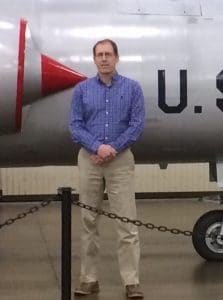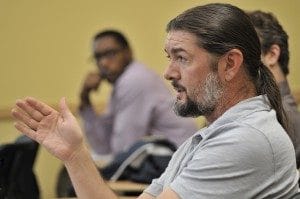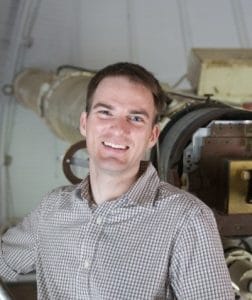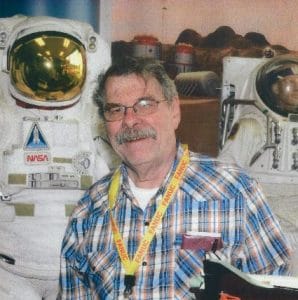 Ron Katz, Moderator
Ron Katz, Moderator
Ron Katz is the director of advancement and external affairs at the New England Air Museum. He has spent 30 years working in the nonprofit world, focusing for the last 15 on building and supporting innovative programs that draw young people into science and engineering careers, including the Connecticut Invention Convention and VEX Robotics. At the New England Air Museum, Ron is working to develop new partnerships and unique initiatives that will help address the state’s urgent need for skilled manufacturing workers in the aerospace industry. Ron holds an MBA in finance from the University of Connecticut, a BA in international relations from the Maxwell School at Syracuse University, is SCUBA certified by the Professional Association of Diving Instructors, but has never been to space.
 Jim Greenwood, Panelist
Jim Greenwood, Panelist
Jim Greenwood teaches courses in cosmochemistry, petrogenesis, planetary science, and Earth materials in the Department of Earth and Environmental Sciences at Wesleyan University. His primary research area is on the study of water and volatile elements in lunar samples returned during the Apollo missions and meteorites.
 Priyamvada Natarajan, Panelist
Priyamvada Natarajan, Panelist
Priyamvada Natarajan is an astrophysicist and professor at Yale. She has made seminal contributions to our current understanding of the formation and growth of black holes and of the nature of dark matter by mapping it using gravitational lensing. Recipient of many awards and honors, Priya is the current chair of the Division of Astrophysics of The American Physical Society and the author of the critically acclaimed book Mapping the Heavens: The Radical Scientific Ideas that Reveal the Cosmos. She and her work have been featured in many news outlets including The New York Times, Quartz, BBC, CNN, New York Review of Books, PBS’ NOVA, NPR, Science Friday and Quanta Magazine to name a few. In collaboration with Acute Art UK and the sculptor Antony Gormley, she helped develop a VR experience LUNATICK that is currently being shown in London.
 Seth Redfield, Panelist
Seth Redfield, Panelist
Professor Seth Redfield studies the atmospheres of nearby exoplanets and the gas and dust floating between the nearest stars, the local interstellar medium. By using telescopes around the world and in space, he has observed nearby stars and uses the spectroscopic signatures of gas, either in the interstellar medium or in the atmosphere around an exoplanet, to measure physical properties such as composition, density, temperature, and motion. This work provides a clearer understanding of our most immediate cosmic neighborhood and the prospects for life elsewhere in the galaxy. Professor Redfield grew up in Lincoln, Nebraska. He was an undergraduate in Boston, participating in the Double Degree Program between Tufts University, where he studied physics and astronomy, and the New England Conservatory of Music, where he studied oboe performance, music theory, and composition. Professor Redfield obtained his PhD at the University of Colorado in Boulder, where he was recognized with the Richard N. Thomas Award. He then moved to the University of Texas in Austin, where he was a Harlan J. Smith Postdoctoral Fellow and a Hubble Fellow. Professor Redfield joined the Wesleyan University faculty in 2008 and is currently the chair of the Astronomy Department.
 Donald Rethke, Panelist
Donald Rethke, Panelist
Donald Rethke was employed by Hamilton Sundstrand beginning in 1963 and actively supported NASA’s manned spaceflight program for over 37 years. He participated in the development of life support technology and systems for every major program from Apollo to the space station. This experience included work on the Lunar Excursion Module (LEM), responsibility for the design development and qualification of the wardroom and hygiene water heaters for the NASA Skylab Orbital Workshop, and contributions to the Shuttle Extravehicular Mobility Unit and Water Spray Boiler system. More recently he had been a leading contributor to the development of the Waste Collection System (WCS) for NASA’s extended duration orbiter flights and for the space station. Mr. Rethke was assigned as a principal engineer in the Advanced Technology group within Hamilton Sundtrand Space Systems International. He lead efforts to develop improved techniques for urine pretreatement on extended duration space flights. He was also actively involved in several projects to build and test advanced prototype regenerative life support systems for future Mars exploration and in the evaluation of current Russian life support systems and components. Now retired, Mr. Rethke is still involved in Hamilton Sundstrand’s community involvement projects such as FIRST Buzz Robotics and space suit presentations under the facade of “Dr. Flush.”
